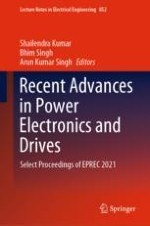2022 | OriginalPaper | Buchkapitel
Comparative Analysis of Conventional and Sliding Mode Control Techniques for DC-DC Boost Converter for PV System Under Transient Conditions
verfasst von : Pankaj Swarnkar, Suresh Kumar Gawre, Gagnesh Akodiya
Erschienen in: Recent Advances in Power Electronics and Drives
Verlag: Springer Nature Singapore
Aktivieren Sie unsere intelligente Suche, um passende Fachinhalte oder Patente zu finden.
Wählen Sie Textabschnitte aus um mit Künstlicher Intelligenz passenden Patente zu finden. powered by
Markieren Sie Textabschnitte, um KI-gestützt weitere passende Inhalte zu finden. powered by
